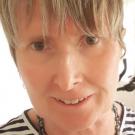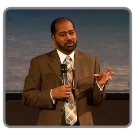Opening Keynote Speaker: Lindsey N. Godwin
What if Questions Were the Answer? Exploring the Principles and Practices of Appreciative Inquiry for our work with Children and Families and Each Other
Some of the most powerful, yet under-used tools we have as practitioners and co-workers are the very questions we ask of others. What if you could learn to be more intentional with the questions you ask so that they help to uncover new possibilities and assets to be leveraged when working with families, with co-workers or even with yourself? In this keynote session, Management Professor and Appreciative Inquiry specialist, Dr. Lindsey Godwin, will invite us to reexamine the power of questions in our professional practices. Unpacking the principles and science behind Appreciative Inquiry, Dr. Godwin will explore how questions shape our reality, our ideas about possibilities for the future, how we see our clients, our colleagues, and our very selves. If what we ask determines what we find, learning to ask appreciative questions can help us create the futures we most want for ourselves and others.

A professor, practitioner and possibilitizer, Lindsey Godwin, Ph.D., has a passion for helping individuals and organizations leverage their potential through strength-based change. She has a master’s degree in conflict resolution from the Jimmy and Rosalynn Carter School for Peace and Conflict Resolution George Mason University, and a Ph.D. in Organizational Behavior from the Weatherhead School of Management at Case Western Reserve University, where she studied with the founding thought leaders in Appreciative Inquiry. She currently holds the Robert P. Stiller Endowed Chair of Management in the Stiller School of Business at Champlain College in Vermont, where she serves as the academic director of the David L. Cooperrider Center for Appreciative Inquiry (AI). A sought-after international speaker, consultant, and facilitator, Godwin has worked with organizations across the globe and her work has been published in a variety of journals and books.
Plenary Presenter: Nicki Weld
Courage and Compassion in Child Welfare
A key message from the Munro Review of the UK Child Protection System (2011) was the importance of child welfare workers being both authoritative and compassionate in their work. When faced with adverse situations, courage provides a way for workers to hold an authoritative position in their work and not lose their protective intent for children. Compassion is essential to support the relational work required in the components of Safety Organized Practice. In this presentation Nicki will share her doctoral work on the concept of courage, along with the application of compassion to enable connection when working with confronting behavior in child welfare.

Nicki Weld, Ph.D., is currently the National Social Work Advisor for Stand Children Services, a child and family NGO in New Zealand that works with recovery and prevention of relational trauma. She is a Director of CNZN Ltd, New Zealand, which provides training, facilitation, supervision, consultancy and solutions for child protection and social service management and workers. Weld also has worked in the fields of social service and child welfare as a professional leader for social work in general health, senior social worker, supervisor, senior child protection trainer, and as a national social work advisor within the New Zealand government sector.
Keynote Speaker: Laurie Ellington
The Neuroscience of Engagement: Moving from Protection to Connection
Unresolved complex trauma compromises neural functioning. It can lead to hyperarousal, overwhelm, and shut down. The human nervous system has a built-in protection mechanism to manage dangerous situations. Psychological safety and connection underpin the neurobiology of the social engagement system, which is foundational to helping people transform suffering. Addressing states of dysregulation and avoiding re-enactment of conditioned responses in the nervous system when working with survivors of trauma lies at the heart of connection and engagement. This applies to engaging and developing the potential of the child welfare workforce as well, as many of them have experiences of trauma, either directly or vicariously from working with families who suffer from a history of abuse, maltreatment, and neglect.
This presentation draws on breakthroughs in modern neuroscience and mind-body research, providing cutting-edge discoveries related to the biology of engagement and psychological safety- the foundation to mobilizing positive change. Participants will learn a brain-based framework for cultivating a climate of trust, engagement and collaboration, along with fresh insights into how to help people develop new habits that support healing and transformational change.

Laurie Ellington, M.A., LPC, RCC, HMCT is co-founder and Chief Executive Officer of Zero Point Leadership, a leading-edge neuroscience-based organization for personal and leadership learning and development. She is also co-founder of NeuroLeader University, the world's first neuroscience-based online university dedicated to expanding personal and leadership greatness through science-based learning, and the co-author of Six Steps to Unlocking Extraordinary Leadership: The Neuroscience of High-Performance Leadership. Laurie has over 20 years of experience in coaching, training consulting, and mind/body medicine.
Keynote Speaker: Kenneth V. Hardy
Understanding Racial Trauma
Racial trauma is an inescapable byproduct of persistent exposure to repressive circumstances that emotionally, psychologically and physically devastates one’s sense of self while simultaneously depleting one’s strategies for coping. It is a life altering and debilitating experience that affects countless numbers of people of color over multiple generations. Unfortunately, the failure to consider the interrelationship between racial oppression and trauma limits our ability to work effectively with the People of Color who live in the midst of sociocultural conditions that are injurious to their psyches and souls. Even when clinical work is trauma informed, it rarely devotes adequate attention to racial oppression and the pervasive trauma associated with it. This presentation will provide a comprehensive overview of the anatomy of racial trauma and the debilitating hidden wounds associated with it.

Kenneth Hardy, Ph.D., is a clinical and organizational consultant at the Eikenberg Institute for Relationships in New York, NY, where he also serves as director. He provides Racially Focused Trauma Informed training, executive coaching, and consultation to a diverse network of individuals and organizations throughout the United States and abroad. He is a former Professor of Family Therapy at both Drexel University in Philadelphia, and Syracuse University in New York, and has also served as the Director of Children, Families, and Trauma at the Ackerman Institute for the Family in New York, NY.
Following his keynote presentation, Kenneth Hardy will present an additional plenary presentation:
Plenary Speaker: Kenneth V. Hardy
Strategies for Addressing Racial Trauma
This session will be devoted to highlighting trauma-informed interventions and strategies that centralize race and racial oppression in every facet of the professional relationship. We will discuss issues of racial micro-aggressions and implicit bias.
Learning objectives:
- Apply a racially sensitive, trauma-informed framework to uncover the hidden trauma wounds that often underpin the health disparities that stifle the lives of African Americans and other racially oppressed populations
- Effectively assess and address the hidden wounds of racial trauma
- List three strategies that providers can employ when working from a racially-sensitive, trauma-informed framework
- Demonstrate how the unrecognized, unexplored, and/or unresolved racially-based attitudes, beliefs, and behaviors of providers and other work personnel can often impede efforts to fully engage and serve racially traumatized clients effectively
Closing Keynote Presenter: Sade Burrell
Protect the Crown
Using the metaphor, “protect the crown,” attendees will learn the true meaning behind their purpose in life as a person and as a professional in the field of social work. Through the Safety Organized Practice (SOP) framework lens and a series of personal stories, Sade uses her experiences as a foster youth and as a social worker to help child welfare staff achieve engagement, assessment, teaming, and planning with a family and their network.

Sade Burrell, M.S.W., has been recognized throughout California for her efforts to eliminate child abuse through her advocacy work. Her advocacy work has led to the passing of Senate Bill 1252, a bill that provides former foster youth with stable housing until age 25 while enrolled in post-secondary education. As a member of the Child and Family Strengthening Advisory Board, Burrell focuses on how she can use her expertise to change child welfare services. Now, as a doctoral student, she hopes to provide a unique perspective of the foster care system and how it impacts post-secondary education for youth who experienced foster care.
